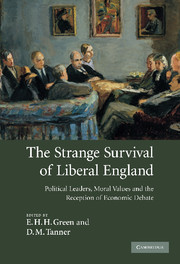 The Strange Survival of Liberal England
The Strange Survival of Liberal England Book contents
- Frontmatter
- Contents
- Acknowledgements
- List of abbreviations
- List of contributors
- Introduction
- Part I Economic ideas and political leaders
- 1 Utilitarian or Neo-Foxite Whig? Robert Lowe as Chancellor of the Exchequer
- 2 Political economy, the labour movement and the minimum wage, 1880–1914
- 3 Economic interpretations of war: American liberals and US entry into World War I
- 4 Political leadership, intellectual debate and economic policy during the second Labour government, 1929–1931
- Part II The use and abuse of economic ideas: Keynes and his interpreters
- Part III Economic forces and their significance
- Index
4 - Political leadership, intellectual debate and economic policy during the second Labour government, 1929–1931
Published online by Cambridge University Press: 04 July 2009
- Frontmatter
- Contents
- Acknowledgements
- List of abbreviations
- List of contributors
- Introduction
- Part I Economic ideas and political leaders
- 1 Utilitarian or Neo-Foxite Whig? Robert Lowe as Chancellor of the Exchequer
- 2 Political economy, the labour movement and the minimum wage, 1880–1914
- 3 Economic interpretations of war: American liberals and US entry into World War I
- 4 Political leadership, intellectual debate and economic policy during the second Labour government, 1929–1931
- Part II The use and abuse of economic ideas: Keynes and his interpreters
- Part III Economic forces and their significance
- Index
Summary
The events leading up to the formation of the National Government in 1931 have always been the subject of controversial interpretations. In the immediate aftermath of the devastating 1931 election defeat, Labour constructed myths of betrayal by its leaders which cast a long and influential shadow. The first academic interpretations of the 1929–31 Labour government's policies were products of the 1960s and 1970s. For Robert Skidelsky, writing at a time when Keynesian ideas were widely accepted, it was the Labour party's limited engagement with such ideas in 1929–31 (and its preoccupation with trade union interests and with socialism) which created its downfall. Economic historians subsequently debated the influence of Keynesian ideas on the Labour party and others. More recent work on Labour's financial and taxation policies has added considerably to our understanding of 1929–31, whilst reinforcing Ross McKibbin's defence of Labour's decisions as neither ultra-orthodox nor out of step with practice in other countries. This work sits comfortably alongside studies which reveal the policy limitations imposed by the international financial context. The definitive biography of MacDonald has defended the party leader from the myths constructed by the party after the event. By the 1980s, while no one would call the government a success, stressing the context had made it seem less of a disaster. By contrast, later studies of the Labour party during the 1929–31 government have been implicitly more critical, recognising that whatever the economic advice, politicians were not ciphers. They did not have to accept Treasury orthodoxy.
- Type
- Chapter
- Information
- The Strange Survival of Liberal EnglandPolitical Leaders, Moral Values and the Reception of Economic Debate, pp. 113 - 150Publisher: Cambridge University PressPrint publication year: 2007
- 3
- Cited by


